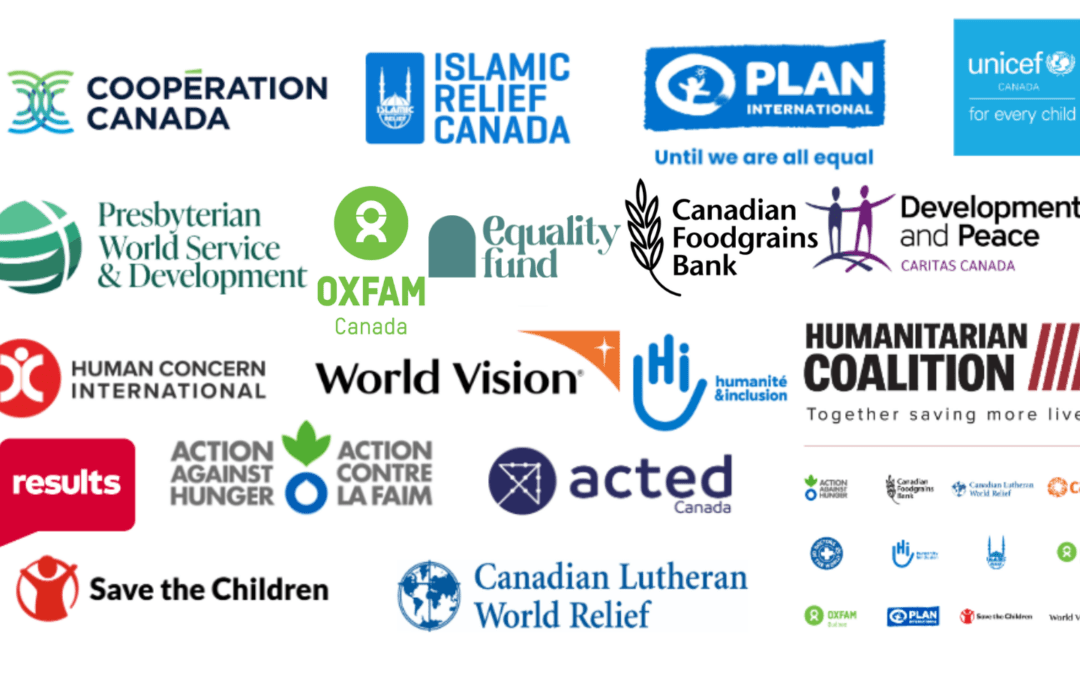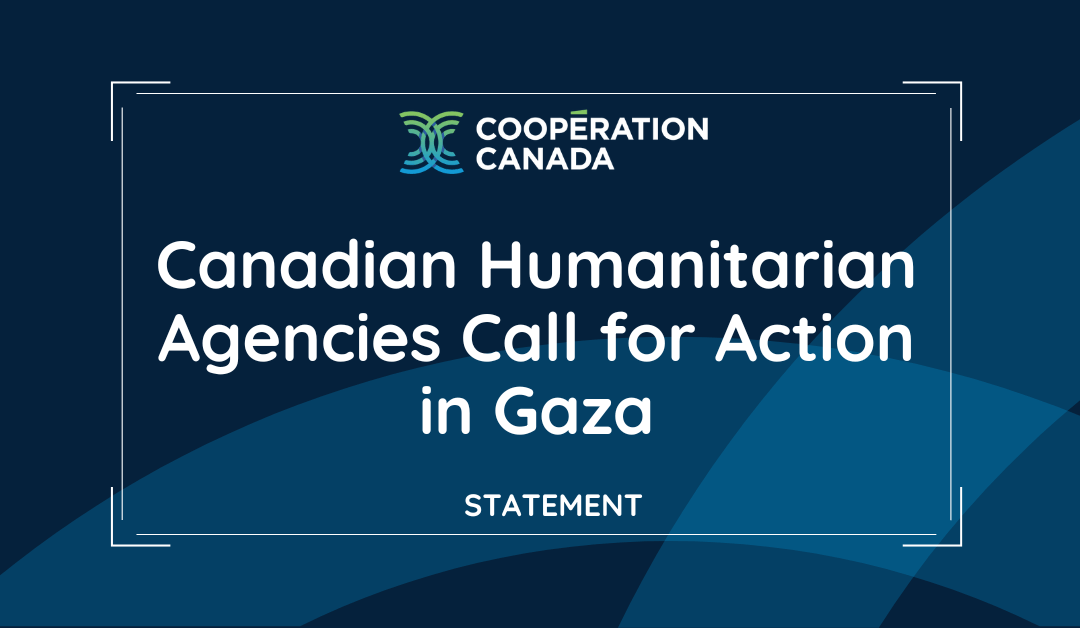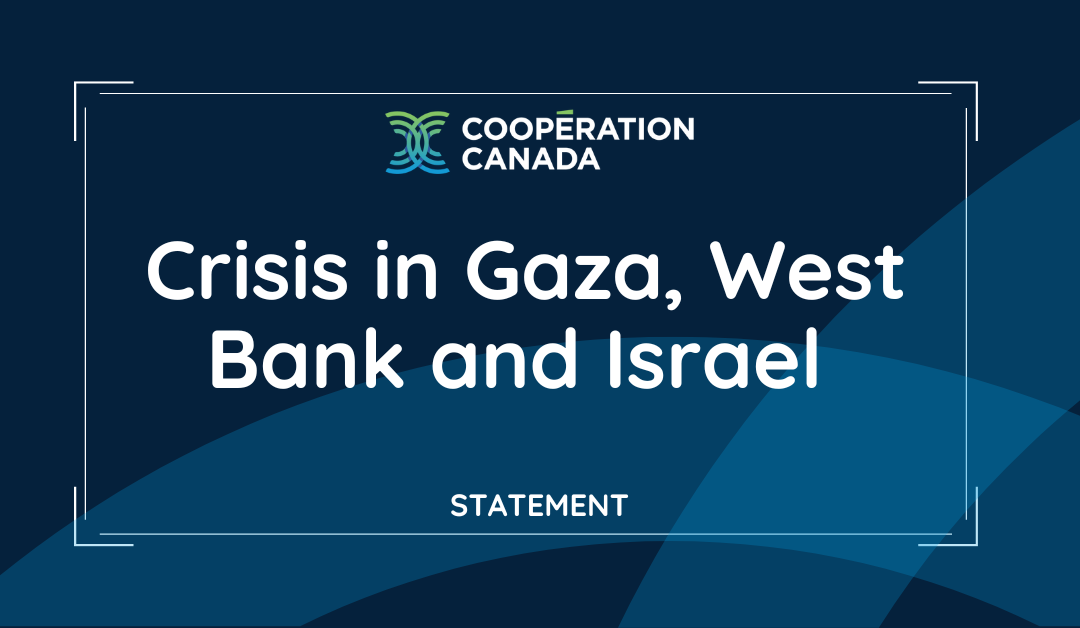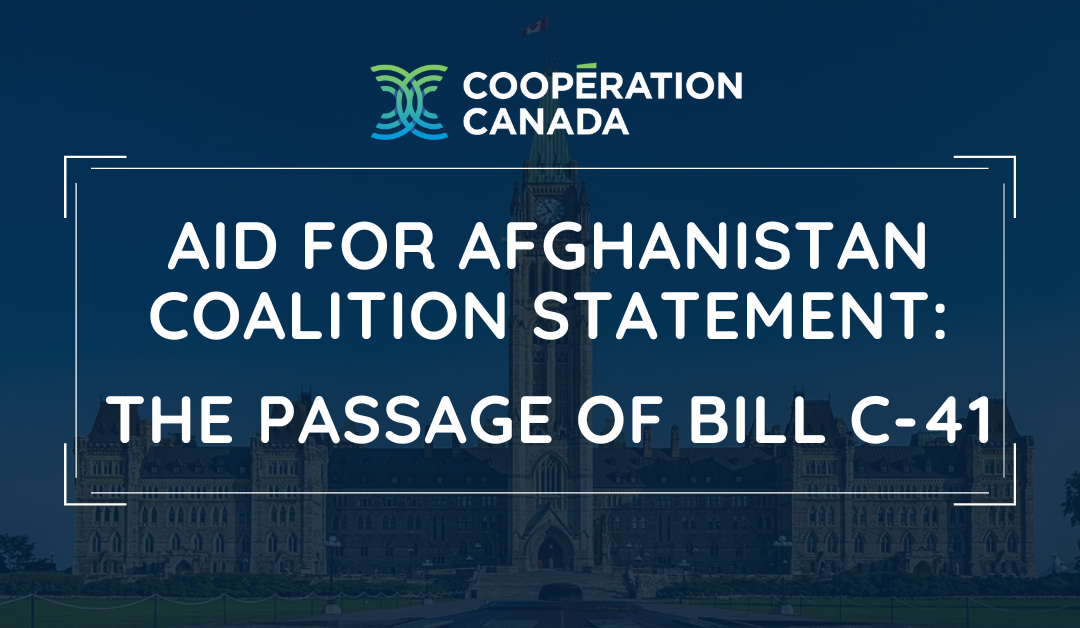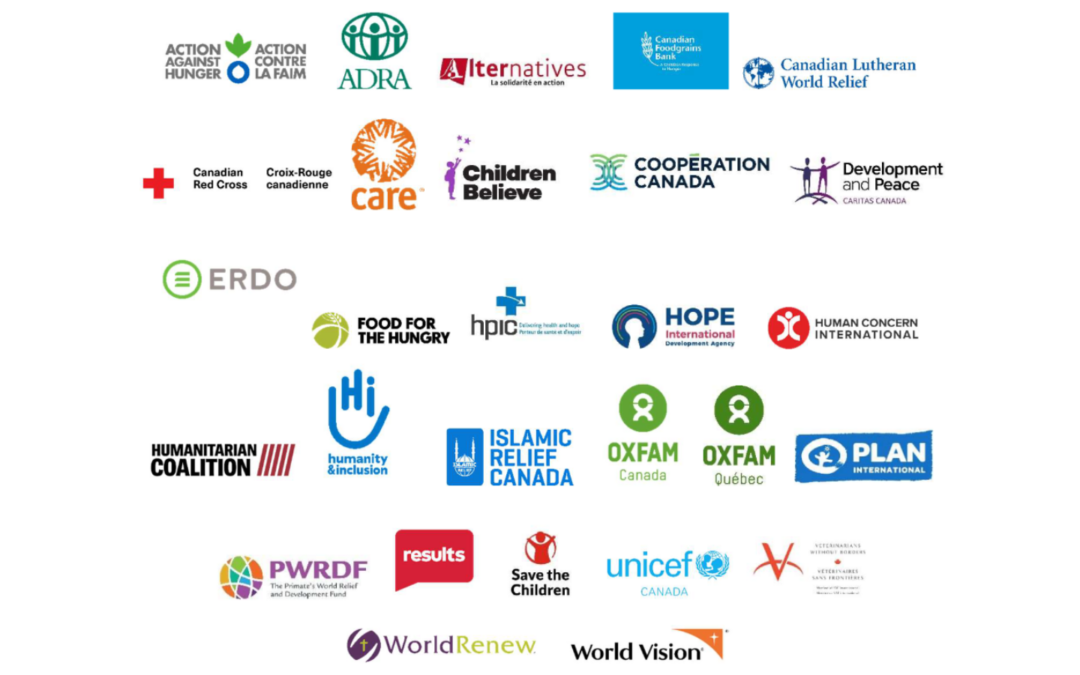OTTAWA, 19 June 2024 – As Parliament breaks for summer, Canada’s leading humanitarian agencies held a press conference today on Parliament Hill to call on the Government of Canada to take urgent and decisive actions to press for an end to the war in Gaza and prevent further mass atrocities.
Since October, we have witnessed the death of tens of thousands of innocent civilians in Gaza, including a record number of targeted attacks on humanitarian workers. Palestinians, including our own teams and partners, face attacks, relentless bombing and continual forced displacement. Those who survive risk dying from hunger, dehydration, and sickness due to the denial of clean water, fuel, healthcare and food. Under the threat of imminent famine, children are dying of malnutrition, with numbers only projected to grow, due to the intentional obstruction of humanitarian aid by Israeli authorities.
The deliberate blocking of aid, coupled with the ongoing indiscriminate violence and targeted attacks against civilians and civilian infrastructure — clear violations of international humanitarian law — have culminated in an unprecedented and fully preventable humanitarian catastrophe, which can and must come to an end.
In the last 8 months, we have seen the Government of Canada demonstrate their ability to take effective positive action on several instances, including its vote in favor of a ceasefire on December 6th at the UN General Assembly and the motion adopted on March 18th to stop arms transfers to Israel. Now again, as Parliament rises for the summer, is the time for Canada to take further decisive actions that match statements in support of international law.
Today, our 13 organizations called on the Canadian government to urgently:
- Ensure the complete halt of all arms transfers to Israel, including those already agreed to prior to January 8, 2024;
- Adopt robust diplomatic measures to pressure Israel to abide by the International Court of Justice order to stop the obstruction of humanitarian assistance;
- Join third-state efforts to press all parties to this conflict to accept and immediately implement the ceasefire resolution adopted by the UN Security Council on June 10, and ensure no new occupation or territorial modification of Gaza;
- Concretely support, through robust funding and firm public statements, support for humanitarian access and assistance, with UNRWA as its cornerstone.
Right now, while Parliament and Canadians prepare for their summer break, this human-made humanitarian crisis deteriorates exponentially. Our teams on the ground continue to do everything in their capacities to assist civilians desperately in need of protection and aid. We urge our Canadian government to do the same.
Quotes from the press conference speakers:
Danny Glenwright, Save the Children’s President and CEO said: “It is appalling that children are dying because of malnutrition, dehydration and disease – deaths that sufficient humanitarian access would have prevented. Their deaths are the result of aid restrictions, ongoing fighting, and insufficient action from the international community to enforce international humanitarian law. Save the Children calls for an immediate and definitive ceasefire, it is the only way to save lives in Gaza. There is no alternative.”
Béatrice Vaugrante, Oxfam-Québec Executive Director, said: “It is unacceptable that we are collectively letting famine set in across Gaza, and allowing humanitarian action to be made nearly impossible by persisting bombings, aid access denials, and targeting of humanitarian facilities and personnel. Every red line in the respect for basic principles of human dignity has been crossed. Third states cannot give up their efforts to prevent further catastrophe, including long-lasting obstacles to a sustainable solution. Canada and other UN members must make clear that Israel’s occupation of the whole of Gaza must come to an end under the proposed ceasefire deal, as well as the West Bank, including East Jerusalem.”
Darryl Loewn, Executive Director Mennonite Central Committee Manitoba: “Can you help us help?” This was the call we received in October from partners in Gaza in response to the emerging humanitarian crisis and devastating violence. Since then, they have not stopped responding, nor have they stopped asking us to act to end violence and increase the impact of their work. We also witness concern from Canadians of faith and their desire to see everyone, in Gaza, the West Bank, and Israel, living in peace and dignity. This is a fully preventable catastrophe. As Mennonites, to call for peace and justice is a part of our work. We urge the Canadian government to help us help by doing everything in their power to act for an end to violence, including pushing for a ceasefire and full delivery of aid, and halting arms transfers.”
Anne, Delorme, Executive Director of Humanity & Inclusion Canada, “We call on the Government of Canada to put pressure on all Parties to the conflict to reach a ceasefire. The use of explosive weapons in populated areas has led to 37,000 deaths and 85,000 severely injured. These injuries include loss of limbs and brain trauma that will lead to long term disabilities for a generation of Palestinians. The use of explosive weapons in Gaza also threatens the lives of humanitarian aid workers, impeding their ability to respond adequately and quickly to the vast and growing needs of civilians.”
Usama Khan, CEO of Islamic Relief Canada said, “Palestinians in Gaza do not have the luxury to take a break or step away from what is happening to them. Aid organizations have been tirelessly underscoring the urgency of this situation and just how catastrophic each passing day has been. Enduring over 250 days of forced starvation, dehydration and incessant bombing, Palestinians face an intolerable reality. They can not bear to witness another day of this, let alone another few months. The Canadian Government needs to take clear, concrete and urgent action now. “
Paul Farran, Cooperation Canada’s Director of Policy and Advocacy said: “Coming out of the G7 held last week, Canada and other G7 countries deplored all losses of civilian lives equally, and noted with great concern the unacceptable number of civilian casualties especially women and children. These words must be followed up on with concrete actions to ensure the consistent respect of human life and dignity. No party to any conflict bears the right to systematically and repeatedly violate international law.”
Quotes from endorsing organizations calling for decisive action:
“As signatories to this urgent call for action, IDRF stands firm in demanding decisive measures from Canada to translate its statements into meaningful actions. The time for rhetoric alone has passed; it’s now about tangible, life-saving actions.” – Mahmood Qasim, CEO, IDRF
“We refuse to be silent witnesses while Israël is intentionally killing tens of thousands people with bombs and denial of life-saving assistance including vital health care. It is time for Canada to move beyond words, and concretely do everything in its power to stop the mass killing of civilians and other grave international humanitarian law violations we are witnessing on a daily basis.” – Nadja Pollaert, Executive Director, Doctors of the World Canada
“How many innocent Palestinians dead, injured, traumatized and in famine will it take for Israel to stop this collective punishment? When will Israel’s allies say, ‘enough is enough,’ and that international law must be respected and applied? Our partners are risking life and limb to deliver precious food, water and medicine to people who have nowhere left to run. In their name, we say that the blockades and bombings must stop now! It is Canada’s responsibility to press for a permanent ceasefire; to unequivocally support the ICJ and ICC; and to help build a just peace plan under which Israel and Palestine can coexist in dignity as equals.” – Carl Hétu, Executive Director, Development and Peace – Caritas Canada
“Canada must step up its efforts to end the violence and ensure Canadian humanitarian relief charities can safely deliver aid to those in desperate need. We cannot afford to be silent or passive; our actions today will determine the fate of countless innocent lives. We urge the Canadian government to uphold its commitments to international law and human rights by taking bold and immediate steps to alleviate this crisis.” – Mahmuda Khan, CEO, Human Concern International
“Israel’s deliberate destruction and blocking of aid has made it impossible for humanitarian agencies like Oxfam to provide life-saving assistance in Gaza. The withholding of aid from civilians and the targeting of aid workers is in direct violation of International Humanitarian Law. Canada must demonstrate its commitment to human rights and justice by demanding an immediate and unconditional ceasefire and ensuring humanitarian aid can reach those in need.” – Lauren Ravon, Executive Director, Oxfam Canada.
“Children are always the innocent victims in any conflict and suffer the most. Every child has the right to live without violence and fear, a right that the global community must protect. Right now, there is nowhere safe for civilians inside Gaza. Plan International Canada condemns all violence and calls for an immediate and unconditional ceasefire from all parties involved. Canada must urgently intervene to halt the grave violations of international humanitarian law occurring in Gaza.” – Lindsay Glassco, President and CEO, Plan International Canada
“The blockade of aid into Gaza resulting from the ongoing conflict in the region has deprived Palestinians of their basic human rights and caused unimaginable suffering – particularly on women and children. We cannot stand by while millions of lives hang in the balance. The Government of Canada needs to take decisive actions to ensure the unhindered delivery of humanitarian aid and an immediate ceasefire,” – Barbara Grantham, ICD.D, President and CEO, CARE Canada
CARE Canada
Development and Peace – Caritas Canada
Doctors of the World Canada
Humanity and Inclusion
Human Concern International
Islamic Relief Canada
Mennonite Central Committee Canada
Mennonite Central Committee Manitoba
Oxfam Canada
Oxfam-Québec
Plan International Canada
Save the Children
The International Development and Relief Foundation
For all media queries, please contact:
Doctors of the World Canada: Mélissa Cabana, 514-799-8985, [email protected]
Humanity & Inclusion: Fatou Thiam, [email protected]
Human Concern International: [email protected]
Islamic Relief Canada: Mashaal Saaed, 647-919-1580, [email protected]
Mennonite Central Committee: Laura Kalmar, [email protected]
Oxfam Canada: Laveza Khan, External Affairs Specialist, 613-240-4157, [email protected]
Oxfam-Québec: Elisabeth Simard, 514 265-0119 [email protected]
Plan International Canada: [email protected]
Save the Children: Julie Marshall, Senior Manager, Media, 905 818 2664 [email protected]


